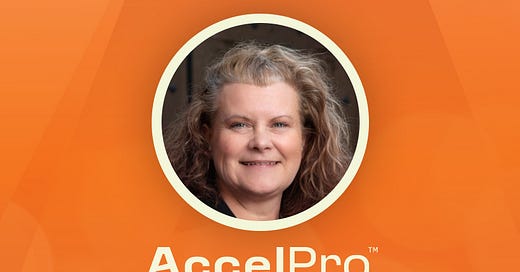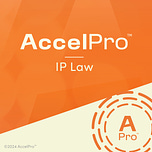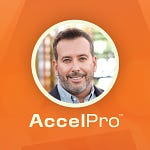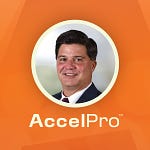You’re invited to join a confidential discussion on Working Effectively with Legal Recruiters. More events to accelerate your career are coming soon.
Welcome to AccelPro IP Law, where we provide expert interviews and coaching to accelerate your professional development. Today we’re featuring a conversation with Kristen Osenga, Professor of Law and Associate Dean for Academic Affairs at University of Richmond School of Law.
In this conversation, Osenga explains her view of predatory infringement as compared to efficient infringement in patent law and which specific circumstances encourage predatory infringement. She also discusses the long-term ramifications of eBay v. MercExchange, strategies for smaller patent portfolio holders and her path to academia.
Listen on Apple Podcasts, Spotify and YouTube.
Interview References:
Kristen Osenga’s University of Richmond School of Law profile.
5:59 | eBay Inc v. MercExchange LLC, No. 05–130, (2006). Certiorari to the United States Court of Appeals for the Federal Circuit.
17:05 | Avanci 5G Vehicle. Avanci.
Supplemental Materials:
Osenga, Kristen. "Efficient" Infringement and Other Lies. 52 Seton Hall Law Review 1085, (2022).
Osenga, Kristen. Striking the Right Balance: Following the DOJ's Lead for Innovation in Standardized Technology. Akron Law Review: Vol. 54: Iss. 3, Article 4, (2021).
TRANSCRIPT
I. PREDATORY INFRINGEMENT AND COPYRIGHT
Neal Ungerleider, Host: We’re here to talk about efficient infringement with Kristen Osenga. Kristen is Associate Dean for Academic Affairs and Austin E. Owen Research Fellow and Professor of Law at the University of Richmond School of Law. Can you tell our listeners about your work and your background?
KO: I'm a law professor. I teach patent law and antitrust. I teach a first year class in legislation and regulation, and I've taught a variety of courses over my career. I'm also the Associate Dean for Academic Affairs.
As far as my background, I started off with an undergraduate degree in biomedical engineering from the University of Iowa. Then I went to grad school and got a master's degree in electrical engineering from Southern Illinois University at Carbondale. While I was there, I worked as a computer programmer at a medical education software company, left there and got my J.D. from the University of Illinois at Urbana-Champaign, and then I started my legal career. I worked for a couple of years at Finnegan where I did patent prosecution and litigation as part of the electrical practice group, then I clerked for a couple of years for Judge Richard Lynn on the federal circuit.
I started my academic career at Chicago Kent College of Law, as a visiting assistant professor in 2004. I've been at the University of Richmond since 2006.
NU: Can you give a brief overview of what efficient infringement means in the context of patent law and why it's important?
KO: I'm going to reframe it as predatory infringement, because I think that's actually a more apt description than efficient infringement. I'm going to explain why–I'll continue to call it efficient infringement because that's the normal lingo but I personally like to think about it as predatory infringement instead.
The way we usually think about patent infringement is the patent owner will sue the accused infringer for infringement. If the jury or the court finds the patent to be infringed and not invalid, the usual remedies are money damages for past infringement and then an injunction that prevents future infringement.
After that, the parties may or may not negotiate a license that allows the infringer to continue to do the activity. In that case, the injunction serves a couple of purposes. First, injunctive relief is the essence of the rights granted by a patent. What a patent gives you is the right to exclude others.
Really, there's nothing else a patent gives you, so an injunction is the manifestation of that right to be able to exclude others. But the threat of injunctive relief also is meant to deter infringement.
You could build a business around infringing a patent, set up your factory, and set up your marketing – all of that. But if you're found liable for infringement and enjoined, then all of that setup goes to waste.
So when there's injunctive relief on the table, you're more likely to proactively seek a license before you start infringing or take other actions to curb that risk of being enjoined.
That's the background of what happens normally. With that in place now, imagine a world where injunctive relief is unlikely to be granted, even if you're an infringer. Even if the patent is not found to be invalid and even if a court finds you to be infringing, this may set up a different mindset for the infringer.
The infringer now–if we don't think that they might be enjoined–could say “I'll go ahead, take a license and I'll pay to use this patent… Or I could just go ahead and infringe, because if I'm found liable for infringement, the worst that will happen is having to pay damages for past infringement and a royalty rate going forward for future infringement.”
There's some benefits beyond that. If a court is determining the royalty rather than the parties as part of a license negotiation, the royalty rate set by the court in lieu of enjoining could be much lower than the patent owner was asking for or would have asked for initially.
The infringer might also say “Maybe I'll end up paying less and that would be awesome, or I'll have a certain period of royalty free infringement before the case concludes.” So it's like an interest free loan to the infringer.
In the best case scenario, the patent owner won't ever sue and they’ll end up paying nothing at all for using the same technology.
Efficient infringement, or predatory infringement, is an option in cases where injunctive relief is unlikely to be granted. It's a problem in patent law because it changes how patent law is normally meant to work.
This all really started in the mid-2000s with the Supreme Court's eBay v. MercExchange case.
—
II. CIRCUMSTANCES THAT BENEFIT PREDATORY INFRINGEMENT
NU: Are there any industries where this is relatively more common?
KO: Not necessarily industries, but circumstances. It doesn't make a ton of sense to engage in efficient infringement or predatory infringement, unless you have a pretty good idea that an injunction will not be issued.
Prior to the Supreme Court's decision in eBay, injunctive relief was being issued 90 to 95 percent of the time. Numbers go up and down, but it's still a pretty certain remedy in most cases of patent infringement.
The two primary circumstances where injunctive relief is routinely denied, meaning that efficient infringement is a good bet, are in the cases of patent licensing firms and standard essential patents.
Patent trolls are what most people call patent licensing firms–which is what I like to call them. I think patent trolls is a rather derogatory term, but patent licensing firms better reflects what these companies actually do. Patent licensing firms are less likely to get injunctive relief if infringement is found than companies that actually make something.
The idea is that these companies don't make things but make all of their revenue based on licensing patents. There are bad patent trolls that just go out and sue on a whim on bad patents, but there are a lot of good reasons for firms to license their technology and make money off of that whether they're making something or not.
These patent licensing firms are one of the cases where injunctive relief is less likely. There's a couple of reasons for it. First, the Supreme Court's eBay decision that set this whole situation into motion basically said that if money damages will make you whole, then you are less likely to get injunctive relief.
The idea with a patent licensing firm who's not making something that competes in the same market and is basically running a business off of getting licensing fees is that if they continue to give you licensing fees for the continued infringement, you're getting what you wanted in the first place.
So money damages will make you whole. You're not losing to the competition, and all you wanted in the first place was money… so if we just give you money, that's better.
Because of that, the courts have largely used the eBay test to say that patent licensing firms are unlikely to get injunctive relief. Courts also don't like patent trolls for various reasons–largely because they're built up in the media as terrible things. I don't agree with that.
With that background and the fact that money damages will make them whole, and how the eBay test comes out in favor of no injunction, that's one of the two instances where we're more likely to see efficient infringement.
The other area where we're unlikely to see injunctive relief is in the case of standard essential patents or SEPs. These are actually more interesting to me. When technology standards are being developed, innovative companies who submit technology to the standards organization often will have to make what is known as a FRAND obligation.
The idea there is that if you incorporate my technology into the standard, we want the standard to be successful. Therefore, I will promise, as the innovative company, that any of the technology that I have submitted that is picked to go into the standard, I will promise to license.
I will license it as fair, reasonable, and non discriminatory: FRAND.
They've agreed to this FRAND obligation from the get-go as part of the standards development process. Similarly to patent licensing firms, the way that courts look at this is that you have promised that you will give licenses to this technology and these patents. Money damages, again, will make you whole.
You are not able to exclude people from practicing your technology because you have promised a license in all cases. Because of that, patent owners who hold SEPs or standard essential patents are unlikely to get injunctive relief.
There's another twist here too. As noted, courts don't like patent trolls. In addition to failing the eBay test where they're not going to get injunctions, SEPs have also run into this space where a narrative that's told also makes courts not like them. Courts and commentators have been really captivated by the idea of what's known as patent holdup.
The narrative says that SEP owners allegedly can and will charge exorbitant rates for the use of these SEPs for these patents that are incorporated into the technology standard because of the threat of injunction. If you want to produce a smartphone that runs on the 5G network, you're going to have to license 5G patents.
Maybe the companies who hold 5G patents can hold you up by charging very high fees and you can't say no because a cell phone that doesn't run 5G is no good to anybody, etc.
That's the idea of patent holdup. Courts have incorporated this idea as yet another good reason why injunctive relief shouldn't be issued in cases of infringement of SEPs–because it's not fair to these companies that want to make 5G phones. They need to be able to have access to the technology.
An injunction would prohibit access to that technology; therefore, it's not okay. That's a narrative, and courts and commentators are super captivated by that narrative. But there's been a lot of really good work done by others–not me–that says there's very little empirical evidence that patent holdup actually happens. Cell phone prices actually have gone down over the last ten years, not up as you'd expect if people were actually holding it up.
The idea is that between the FRAND obligation–letting them fail the eBay test–and this idea that SEP owners are holding up implementers, it has turned courts towards an idea of not issuing injunctions in those cases either.
With SEPs, the industries that we're looking at are largely like the telecom space where we have 4G and 5G, as well as standardization happening in the Internet of Things and also in the automotive industry.
NU: How does efficient infringement impact individual inventors and smaller patent portfolio holders versus larger ones?
KO: First of all–from my perspective–efficient infringement or predatory infringement is bad for all patent owners, whether you are an individual inventor or a smaller portfolio owner or a larger portfolio. It's bad for all patent owners because it takes away the right to exclude.
I have an essay forthcoming that talks about how the change in the availability of injunctive relief is affecting the market value of patents generally. What we're seeing is that more licensees are taking non-exclusive licenses, which are generally viewed as less valuable, than are taking exclusive licenses. When we see this shift from people taking exclusive licenses to non-exclusive licenses, one of the inferences we can draw is that the patents are becoming devalued. It’s largely because of this idea that you can't get injunctive relief and that a non-exclusive license is more in line.
But to actually answer the question you wanted answered, particularly for individual inventors or smaller portfolio owners, the idea that infringers will purposely choose to infringe rather than take a license really puts a higher burden on those smaller firms or individual inventors.
They can't engage in negotiations to get their license fees because the infringer has chosen to infringe rather than negotiate a license. They're going to have to sue in order to end up with any sort of remedy whatsoever, and these smaller firms and individual inventors may not have the financial or legal wherewithal that a larger portfolio owner may have at their disposal.
They're not going to have the ability to hang tight while they're going through the litigation process to receive the money they should have gotten from the get go. So it has a very detrimental effect on these smaller firms and individual inventors that may not be able to recoup the money fast enough in order to even stay in business.
NU: And what strategies can patent holders use to help protect against efficient infringement, and how effective are these measures?
KO: One way that patent owners should protect against efficient infringement is to support efforts to overrule the eBay opinion. There have been various proposals as far as I understand–there's even a proposed bill–and over the last few years there has been talk of supporting a bill to overrule the eBay case from the Supreme Court and instead put into play a presumption that injunctive relief will issue anytime patent infringement is found.
Anytime that bill is proposed, patent owners should get behind that bill and focus on legislative efforts to return the presumption of injunctive relief. It's going to need to be a legislative fix because of the Supreme Court opinion in eBay. There's no way to fix that other than to get the Supreme Court to overrule it. They are not going to do that, so it's going to have to be a legislative fix.
Another thing to think about is other jurisdictions, specifically Europe, have been much better about not looking at infringement by SEPs in a monolithic way. In the United States, if you're an SEP owner, you just don't get injunctive relief.
In Europe, there's a little more flexibility. In those sorts of cases in Europe, courts have been more willing to grant injunctive relief–even for standard essential patents. To the extent that you do have an infringer who could be deemed an unwilling licensee under the European framework, taking them to court in Europe might be a way to get injunctive relief, which is different than the United States.
The United States courts have not really jumped on this idea of the unwilling licensee, even though it's been brought up in some cases. It just hasn't really been adopted in the same way that the European courts have. So go to Europe instead of the United States if you have the option.
Another place where we've seen better success for SEP owners is with patent pools. There's been some success with this in the automotive space, for example, with the Avanci 5G pool, where you have various infringers suggesting that they shouldn't have to take licenses because of issues with the patent pool.
Courts–even in the United States–have basically said that, no, the Avanci patent pool is good and you're going to have to take a license from them.
That doesn't necessarily help entirely with the idea of predatory or efficient infringement, but it's good. The idea of patent pools is that it's a collection of standard essential patents that are able to be licensed as a group from the pool organization. It’s often a third party that manages the patent pool.
Therefore, it's good for the licensee, the alleged infringer, the wannabe infringer because it provides one-stop-shopping. They can just pay a fee and get access to a variety of SEPs held by a number of SEP owners. They don't have to go to each individual SEP owner to negotiate individual licenses. It's also good because there's some comparable licenses or a flat fee in many patent pools.
It's also good for SEP owners. I think having your technology incorporated in a patent pool, if that's available to you, is good because I think it's going to deter efficient infringement – even for the smaller patent owner – due to the visibility of the portfolio in a particular technology space.
—
III. CAREER PATHS TO PATENT ACADEMIA
NU: From a high level, how would you describe your career path?
KO: The windy path makes sense if you follow it. I come from a family of educators. I've always thought very highly of teachers, but I also have a scientific brain, so I went into engineering.
What happened while I was in my undergraduate career is that I didn't find a lot of good female engineering role models. At that particular time–and I understand things have changed drastically in the last 30 years–when I was in engineering school in the early nineties, I actually thought I might become an engineering professor so I could be a good role model.
After undergrad, I went to grad school for engineering. I then got a little disheartened about the academic path because my thesis advisor did very little writing. He did a lot of grant writing. He supervised a lab, but he wasn't really hands on.
While I was in grad school, I went to a conference held by the Society of Women Engineers, and there was this fantastic panel titled: “What to Do if You Don't Want to be an Engineer Anymore.” With that panel, I got some information from one of the gentlemen on the panel who was a patent attorney who talked about how great patent law was.
It was a melding of the right brain and the left brain. You get all that science and technology that you loved and probably all the things about why you went to engineering school to start with–but you also get to talk and argue and that art side of the craft of law.
I was really drawn to this idea of having both the technology that I spent way too long in school studying, along with something that would allow me to be more of an education person. I went to law school not thinking I was going to be a law professor, but just thinking that I can talk and I can do science and this is going to be awesome.
When I was in law school, I was sitting around talking to my patent professor, who ended up being a mentor to me. I told him this long, drawn out story and he told me I should be a patent professor and I could be a good role model there. And here I am and I love my job.
NU: Can you give an example of how you relied on peers and not mentors or bosses inside and outside your organization to deal with tough situations?
KO: I think there's a lot to be said about relying on your peers in particular, because they're close in time to the experiences you're having, but also they're not really in a position to impact your future. They're not deciding whether or not you get promoted, and they're not deciding whether or not you get a raise.
I have spent my entire career talking to peers whenever I have questions or concerns as my first stop. When I was in practice, I didn't want to look stupid in front of the partners. Oftentimes my first stop would be an associate attorney just a year or two ahead of me to see if I could get an example document from when they were filing this sort of thing.
Or asking them if you're writing a memo for partner X, how do they like it to look? I would get that from my peers, but they also helped in personal situations. I had my first child when I was a second year associate at a big patent law firm, which was very unusual at the time.
I was reaching out to my peers because while partners having babies was one thing, associates having babies was a whole new territory. I was reaching out to my peers, asking “How do I handle this?” “Who do I talk to first?” “This is odd, right? Nobody takes maternity leave within 12 months of starting a job.”
That was a time when I relied a lot on my peers to steer me in the right direction. In academia, it's really been the same thing. When I was going through the tenure process, I reached out to professors who were just a year or two ahead of me for advice.
They're close enough in time, but they're not going to be in a position to judge me or decide my future. I think using your peers is the best way forward, oftentimes, and your first pass.
Listen on Apple Podcasts, Spotify and YouTube.
This AccelPro audio transcript has been edited and organized for clarity. This interview was recorded on November 9, 2023.
AccelPro’s expert interviews and coaching accelerate your professional development. Our mission is to improve your day-to-day job performance and make your career goals achievable.
Please send your comments and career questions to questions@joinaccelpro.com. You can also call us at 614-642-2235.
If your colleagues in any sector of the IP law field might be interested, please let them know about AccelPro. As our community grows, it grows more useful for its members.












